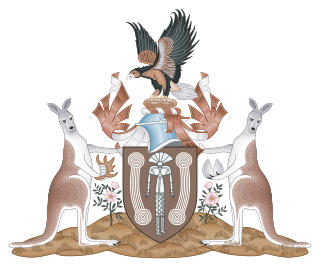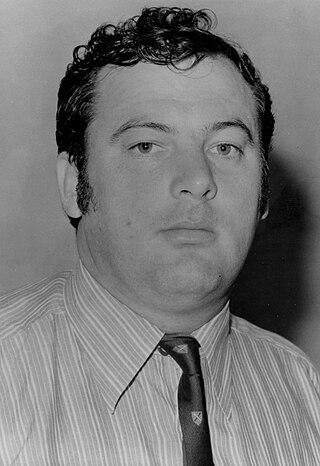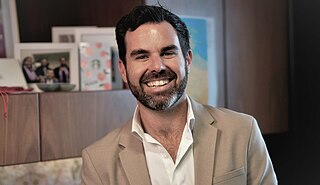
The Country Liberal Party of the Northern Territory (CLP),commonly known as the Country Liberals,is a centre-right and conservative political party in Australia's Northern Territory. In territory politics,it operates in a two-party system with the Australian Labor Party (ALP). It also contests federal elections as an affiliate of the Liberal Party of Australia and National Party of Australia,the two partners in the federal coalition.

Clare Majella Martin is a former Australian journalist and politician. She was elected to the Northern Territory Legislative Assembly in a shock by-election win in 1995. She was appointed Opposition Leader in 1999,and won a surprise victory at the 2001 territory election,becoming the first Labor Party (ALP) and first female Chief Minister of the Northern Territory. At the 2005 election,she led Territory Labor to the second-largest majority government in the history of the Territory,before resigning as Chief Minister on 26 November 2007.

Denis Gabriel Burke is a former Australian politician. A former Australian Army officer,he served as a Country Liberal Party member of the Northern Territory Legislative Assembly from 1994 to 2005. He spent two years as Chief Minister after succeeding Shane Stone,but oversaw the CLP's defeat at the 2001 election,ending 27 years of continuous CLP government in the Northern Territory. Burke later served as Opposition Leader from 2001 to 2003 before being toppled,but was re-elected as leader in 2005. He subsequently took the party to defeat at the 2005 election,culminating in the shock loss of his own seat.

The Legislative Assembly of the Northern Territory is the unicameral legislature of Australia’s Northern Territory. The Legislative Assembly has 25 members,each elected in single-member electorates for four-year terms. The voting method for the Assembly is the full-preferential voting system,having previously been optional preferential voting. Elections are on the fourth Saturday in August of the fourth year after the previous election,but can be earlier in the event of a no-confidence vote in the government. The most recent election for the Legislative Assembly was the 2024 election held on 24 August. The next election is scheduled for 26 August 2028.

Peter McCallum Dowding SC is an Australian lawyer and former politician who was the premier of Western Australia from 25 February 1988 until his resignation on 12 February 1990 due to a leadership spill. He was a member of the Parliament of Western Australia from 1980 to 1990 and a member of the Labor Party.

Nicholas Frank Hugo Greiner is an Australian politician who served as the 37th Premier of New South Wales from 1988 to 1992. Greiner was Leader of the New South Wales Division of the Liberal Party from 1983 to 1992 and Leader of the Opposition from 1983 to 1988. Greiner had served as the Federal President of the Liberal Party of Australia from 2017 to 2020. He served as the Consul-General in the United States of America,New York from 2021 to 2023.

Casuarina is an electoral division of the Legislative Assembly in Australia's Northern Territory. It was first created in 1974 and was named after the adjacent suburb of Casuarina. Casuarina is an entirely urban electorate,covering only 12 km2 and taking in the suburbs of Brinkin,Nakara,Tiwi and part of Alawa,as well as the Charles Darwin University. There were 5,647 people enrolled in the electorate as of August 2020.

Susan Jill Carter is an Australian politician. She was a Country Liberal Party member of the Northern Territory Legislative Assembly from 2000 to 2005,representing the central Darwin electorate of Port Darwin. After winning a by-election upon the resignation of former Chief Minister Shane Stone,Carter served as Opposition Whip and Shadow Minister for Health,and was briefly touted as a leadership aspirant before being unexpectedly defeated at the 2005 election.

Paul Anthony Edward Everingham is a former Australian politician who was the head of government of the Northern Territory of Australia from 1977 to 1984,serving as the second and last Majority Leader (1977–1978) and the first Chief Minister of the Northern Territory from 1978 to 1984. He represented the northern Darwin seat of Jingili in the Northern Territory Legislative Assembly from 1974 to 1984. He was then elected to the federal House of Representatives,representing the Northern Territory between 1984 and 1987.
Stanley George Evans is a former South Australian LCL and Liberal politician,representing Onkaparinga from 1968 to 1970,Fisher from 1970 to 1985 and Davenport from 1985 to 1993.

Nicholas Manuel Dondas was an Australian Country Liberal politician in the Northern Territory,representing the seat of Casuarina in the Northern Territory Legislative Assembly from 1974 to 1994,and the Division of Northern Territory in the Australian House of Representatives from 1996 to 1998.

Fong Lim is an electoral division of the Legislative Assembly in Australia's Northern Territory.
Ross Oscar Charles Bohlin is a former Australian politician. He was a Country Liberal Party member of the Northern Territory Legislative Assembly,and held his seat of Drysdale from his defeat of sitting Labor member Chris Natt at the 2008 election until 2012.

Adam Graham Giles is an Australian former politician and former Chief Minister of the Northern Territory (2013–2016) as well as the former leader of the Country Liberal Party (CLP) in the unicameral Northern Territory Parliament. Giles is the first Indigenous Australian to serve as a head of government in Australia.

The 2016 Northern Territory general election was held on Saturday 27 August 2016 to elect all 25 members of the Legislative Assembly in the unicameral Northern Territory Parliament.

Lia Emele Finocchiaro is an Australian politician who has served as the Chief Minister of the Northern Territory since August 2024. A member of the Country Liberal Party (CLP),she has represented the seat of Spillett in the Northern Territory Legislative Assembly since her election in 2016. Following the resignation of Gary Higgins on 1 February 2020,she became the Leader of the Opposition in the Northern Territory. Prior to this,she served as the member for Drysdale from 2012 to 2016.

Chanston James "Chansey" Paech is an Australian politician. He is a Labor Party member of the Northern Territory Legislative Assembly since 2016,representing the electorate of Namatjira until 2020 and Gwoja thereafter. He is of Arrente,Arabana and Gurindji descent.
The Martin Ministry was the ministry of the seventh Chief Minister of the Northern Territory,Clare Martin. It was sworn in on 27 August 2001 after Martin's victory 2001 election. In addition to Martin as the first ever female Chief Minister,it also included the first ever indigenous minister in Jack Ah Kit. Martin served until November 2007,when she was succeeded by her deputy,Paul Henderson.
The Burke Ministry was the ministry of the sixth Chief Minister of the Northern Territory,Denis Burke. It was sworn in on 9 February 1999,following the resignation of former Chief Minister Shane Stone the previous day. While Stone told the media that his resignation was "pretty much" of his own timing and he wished to give the new CLP leader sufficient time to prepare for the 2001 election,it followed a meeting of backbenchers and some cabinet ministers advocating his removal. Burke was elected unopposed as leader. It was in office until 26 August 2001,when the Burke government lost the 2001 election to Clare Martin's Labor Party.
The North Australia Party (NAP) was a short-lived political party in Australia's Northern Territory,primarily active in Alice Springs and the surrounding areas of Central Australia. It was founded in 1965 under the leadership of Lionel Rose and contested the Northern Territory Legislative Council election later that year,winning a single seat. The party has been cited as a predecessor of the modern Country Liberal Party (CLP).















